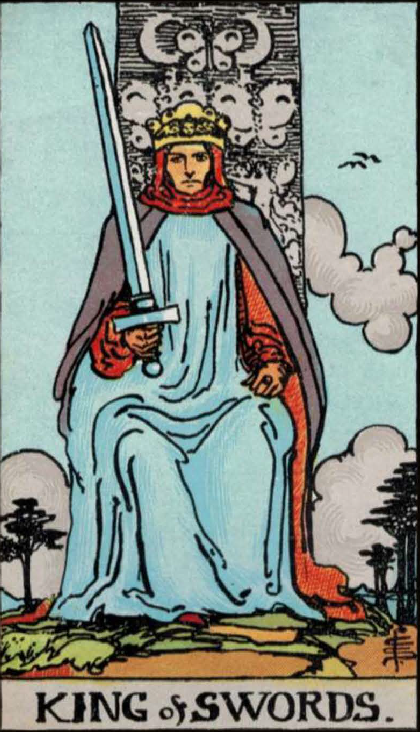The King of Swords Tarot Card: Symbolism, History, and Meaning
The King of Swords tarot card is a commanding card in the tarot deck. Embodying authority, truth, and intellectual power, the King of Swords represents the spirit of fair judgment, clear thinking, and strategic planning. In this comprehensive guide, we'll explore the historical origins, symbolism, and meanings of this powerful card, offering valuable insights into its role in your tarot readings.
The Historical Origins of the King of Swords Tarot Card
The King of Swords, like other court cards in the Swords suit, forms part of the Minor Arcana of the tarot deck. Linked with the element of air, the Swords suit primarily represents intellect, decisions, and conflicts.
As a King card, it often stands for authority, mastery, and leadership. For the King of Swords, this typically manifests in intellectual authority, clear judgment, and strategic planning.
A Vivid Description of the King of Swords Tarot Card
The King of Swords card typically shows a stern king, seated on a stone throne, which signifies stability, power, and authority. The King represents maturity, authority, and a figure of paternal influence.
In his right hand, the King holds a sword upright, pointing towards the sky. The sword is a symbol of intellect, mental clarity, and truth. The upward direction of the sword can signify that the King is a man of action, and his decisions are guided by his intellect and a deep understanding of the truth.
The King's throne is adorned with butterflies and cherubs, representing transformation and divine connection, reinforcing the theme of intellectual and spiritual enlightenment.
The backdrop is a stark landscape and a clear, bright sky, reinforcing the theme of clarity, authority, and vastness of thought. The trees on the far sides indicate growth, life, and stability.
The King's stern and serious face reflects a no-nonsense approach. His demeanor suggests that he is not one to be swayed by emotion but instead governs with truth and fairness.
The Rich Symbolism of the King of Swords Tarot Card
The King of Swords tarot card is rich with symbolism, each element offering unique insights into its meaning:
The upright sword: The upright sword held by the king represents intellectual power, truth, and clarity of thought.
The stone throne: The stone throne signifies a solid foundation of knowledge and wisdom, symbolizing the King's intellectual authority and stability.
The stern expression: The King's serious look signifies a logical and analytical approach, preferring fairness and justice over emotions.
The swirling clouds: The clouds in the background symbolize the realm of thought and intellect, hinting at the King's command over his mental faculties.
The Profound Meanings of the King of Swords Tarot Card
When the King of Swords appears in a tarot reading, it often signifies authority, truth, and intellectual power. It encourages clear thinking, strategic planning, and fair judgment.
Upright, the King of Swords can symbolize intellectual authority, clarity of thought, and a sense of fairness. It encourages you to think clearly, plan strategically, and judge fairly.
In a reversed position, the King of Swords might indicate manipulation, harsh judgment, or an abuse of intellectual power. It could suggest that you are using your intellect in a negative way or are not being entirely truthful.
Final Thoughts on the King of Swords Tarot Card
The King of Swords tarot card carries a potent message of intellectual authority, truth, and strategic planning. Its rich history and potent symbolism offer valuable insights into your intellectual journey. Whether you're new to tarot or an experienced reader, understanding the King of Swords can provide a fresh perspective on your decision-making and strategic planning processes.
Remember, like the commanding King in the card, we all have the capacity to wield intellectual power, discern the truth, and make fair judgments. Embrace these qualities and lead your life with authority, clarity, and strategic thought.
